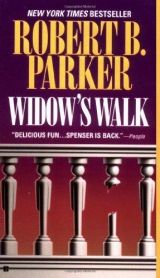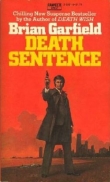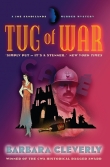
Текст книги "Widow’s Walk"
Автор книги: Robert B. Parker
Жанр:
Крутой детектив
сообщить о нарушении
Текущая страница: 4 (всего у книги 13 страниц)
CHAPTER FIFTEEN
Susan and I and Hawk and a woman named Estelle Raphael were having dinner at a place called Zephyour in the Hyatt Hotel on the Cambridge side of the Charles River. There was a lot of glass on the river side of the room and you could look at the river and across it and see the glare of a night game at Fenway Park.
They made many kinds of martinis here and would serve you a small sampling of three if you wished. Susan and Estelle both wished. Hawk and I stuck with the old favorite.
“I love how they look in the glass,” Estelle said.
Hawk smiled and didn’t say anything. Hawk could be comfortable not saying anything for longer than anyone I’ve ever known. Oddly his silence didn’t make you uncomfortable. It was somehow natural to him. Susan was silent, too. That didn’t make me uncomfortable either, but it wasn’t natural to her. She had already drunk the first little martini, which was sort of a pale green, and had begun on the pink one. This, too, wasn’t natural to her. Normally she would nurse those three little martinis for the night. It looked like the conversation was up to me and Estelle.
“You’re a doctor?” I said.
“Yes. I run a fertility clinic in Brookline.”
“Been running one of those most of my life,” Hawk said.
“I know,” Estelle said. “And it’s fine work that you do.”
The waitress came and took our order. Susan seemed not very interested in the menu. She said she’d have what I had. The black river glistened in the light sprawl from the city. I could see the Citgo sign, which had become famous solely by being visible behind the left-field wall at Fenway. To the right the gray towers of Boston University stuck up too high.
“You okay,” I said to her softly.
She shook her head.
“Want to talk about it?”
She shook her head again.
“Want to go home?”
Shake.
I patted her thigh. She picked up the pink martini and finished it. There were tears in her eyes.
I said, “Hey.” And put my arm around her shoulders. Probably the wrong move. She’d been holding it together before that. Now she began to cry. There was no noise. Just tears on her face and her shoulders shaking. I tried to pull her a little closer so she could cry against my chest. She didn’t want to. We sat for a moment with my arm around her, patting her far shoulder.
“You like to be alone?” Hawk said.
Susan shook her head.
We were quiet. Susan took her napkin from her lap and wiped her eyes.
“Is my makeup fucked?” she said.
Estelle looked at Hawk. Hawk smiled.
“She coming out of it,” he said.
“You look fine,” I said.
“I’m sorry to be such a jackass,” Susan said.
“Is there anything I can do?” Estelle said.
“No. Thank you.”
“You want to talk?” I said. “You want to leave it be?”
“I don’t want to talk,” Susan said, “but I fear that I must. You can’t suddenly burst into tears in the middle of dinner and offer no explanation.”
“You can if you want to,” I said.
Susan shook her head. “I lost a patient today,” she said.
No one said anything. Estelle looked like she might, but Hawk put his hand on her thigh and she didn’t.
“A boy, nineteen years old. He killed himself.”
“Did you know he was suicidal?” I said.
“Yes.”
“Are you feeling that you should have done more and better?”
“Of course.”
“Do you know why he killed himself?”
“He was gay, and he didn’t want to be,” she said. “That’s why he was seeing me. He desperately wanted to be straight.”
“Isn’t that a little outside the scope of your service?” I said.
As she talked she began to focus on the subject, as she always did, and in doing so she came back into control.
“It is hideously incorrect to say that one can help people change their sexual orientation. But in fact I have had some success, in doing just that.”
“Helping gay people to be straight?” Estelle was startled.
“Or straight people to be gay. I’ve had some success doing both. The trick is over time to find out where they want to go, and where they can go, and try to achieve one without violating the other.”
“I’ve never heard that,” Estelle said.
She was genuinely interested, but there was that sound in her voice that doctors get which says, in effect, “If I haven’t heard of it, it’s probably wrong.”
“No one is willing to incur the vast outrage that would ensue,” Susan said.
“It’s your experience,” Hawk said.
“One ought not to have such an experience,” Susan said. “And if one were stupid enough to have it, one should surely not talk about it.”
“Shrinks, too,” I said.
“Hard to believe,” Hawk said.
“We’ve all known people who were married,” Susan said, “and left the marriage for a same-sex lover. Why is it so impossible to imagine it happening the other way?”
“But who would be gay, if they could choose?” Estelle said.
“That is, of course, the existing prejudice,” Susan said. “But it also implies that those who led straight lives could have chosen not to before they did.”
Estelle didn’t look too pleased about existing prejudice, but she didn’t remark on it.
“I guess, as I think of it, that if a gay person entered into a straight relationship I’d assume it was only a cover-up.”
“As if gay is permanent but straight is tenuous,” Susan said.
“I hadn’t thought of it quite that way before,” Estelle said.
Susan nodded. “It’s a hard question,” she said.
“Kid making any progress?” Hawk said.
Susan smiled without pleasure.
“Yes. But it wasn’t the direction he’d come to me looking for.”
“He was discovering that maybe he wasn’t going to change?” I said.
“Yes.”
“You did what you could,” Estelle said.
“I wonder if he’d have been better off without my help,” Susan said.
“The rescue business is chancy,” I said.
Susan smiled at me slowly, and patted my forearm.
“It is, isn’t it,” she said.
CHAPTER SIXTEEN
Hawk was standing at the window of my office looking down at the green Chevy idling in front of Houghton Mifflin.
“Ain’t it about time you and me pulled the plug on the followers?” Hawk said.
“Nope.”
“How ‘bout we go out to the Soldiers Field Development Corporation and shake up their boss?”
“Whom you believe to be Felton Shawcross,” I said.
“Whom else?” Hawk said.
“CEO doesn’t always know what his employees are doing,” I said.
“True,” Hawk said. “You and me for instance.”
“My point exactly,” I said.
“We could yank one of the followers out of his car and hit him until he tell us why he’s following you.”
“He may not know,” I said.
“‘Cause he a employee,” Hawk said.
“Yes.”
“We could ask whom employs him.”
“We can always do that. Just like we can always call on Felton Shawcross,” I said. “Right now I figure if they wanted to make a run at me they would have by now.”
“Probably.”
“So they’re just trying to keep tabs on me.”
“Probably why they following you around,” Hawk said.
“Because they want to know if I’m getting closer.”
“Which they’ll decide based on who you see.”
“Whom,” I said.
Hawk turned around and looked at me and smiled.
“So when you see somebody that’s important, maybe they’ll do something.”
“Yep.”
“And then ya’ll gonna know whom is important.”
“You’re doing that whost.whom thing on purpose, aren’t you?” I said.
“Ah is a product of the ghetto,” Hawk said. “Ah’s trying to learn.”
“And failing,” I said.
“So it is your professed intention,” Hawk said, “to continue visiting with principals in the case until you get a discernible reaction from those monitoring your movements?”
“That be my professed intention, bro,” I said. “You be down with that?”
“Jesus Christ,” Hawk said.
“I don’t sound like an authentic ghetto-bred Negro?” I said.
“You sound like an asshole,” Hawk said.
“Well,” I said. “There’s that.”
CHAPTER SEVENTEEN
Brinkman “Brink” Tyler had his office in a recycled warehouse on the recycled waterfront, not so far from the Harbor Health Club. I couldn’t find an open hydrant, so I parked my car on the fourth level of the garage near the aquarium and walked, with Curly behind me looking intensely like he was just out for a walk. The Lexus that had been following me was pulled up across from me on the little side way that led to the aquarium. To my left the biggest urban renewal project in the country was chattering very slowly along, and corrupting all of the downtown traffic patterns in the process.
I found Tyler Financial Services on the lobby directory and took the elegant brass-and-rosewood elevator to the second floor. I could have found stairs, I suppose, but no one of stature would use them in this building. There was a lot of brick, and a lot of pickled oak, and a lot of hanging plants, and in Tyler’s front office one crisp female secretary with a British accent. To her left a half dozen people were working in front of computer screens. To her right was a large office with an etched glass door. A discreet sign on the door said simply BRINK. I gave her my card and smiled her the smile that made me look just like Tom Cruise only bigger. She smiled back, though not very warmly. She seemed to sense that I wasn’t a client. She checked her appointments, saw that I had one, and took me to the office door that said BRINK. She had a surprising amount of hip sway for one so crisp.
Brink Tyler was in full uniform: striped shirt, wide yellow suspenders, polka-dot bow tie. He looked to be maybe fifty, with a fresh haircut and a good tan. His hair was smooth.
“Brink Tyler,” he said and put out his hand.
We shook firmly and I sat down. Behind Tyler was a huge picture window that overlooked the harbor, where the port of Boston activity was close by and frequent.
“You were Nathan Smith’s broker,” I said.
“What a shame. Yes, I was. And a personal friend as well.”
“How was he doing?” I said.
“Excuse me?”
“How was his economic life?”
“Fine,” Tyler said. “Excellent. Nathan was a member of a very old and successful family in this city.”
“That’s great, isn’t it? Did he have a lot of money?”
“For God’s sake, man, he owned a bank.”
“Wow,” I said. “Could I get a look at his monthly statements?”
“Oh, no. I’m afraid that’s impossible.”
“I represent his wife,” I said.
“No, we’d really need her permission to show you that. She should have them. They went out only last week.”
“She contends that she knows nothing, and only you, Brink Tyler, can answer my questions.”
“My hands are tied,” Tyler said.
“Call her,” I said.
“Call her?”
“Yes. Ask her permission to give me the statements.”
Brink wasn’t thrilled with that. He sat back and thought about it. I sat back and waited. The blue stripes in his white shirt were wide. Tyler’s cuff links were, or appeared to be, solid gold with a small design that I couldn’t make out. Elegant.
“Well,” he said. “I guess I could do that.”
“Good for you,” I said.
He picked up his phone and punched up a number without looking it up. He waited, talked briefly with Mary Smith, nodded several times, probably for my benefit, and hung up.
“No,” he said.
“She won’t authorize the statements?”
“No.”
“She say why not?”
“No.”
“And you didn’t ask?” I said.
“It’s her right,” Tyler said. “She doesn’t have to explain.”
“How nice for her,” I said. “You have any thoughts on who would want to kill Nathan?”
“I thought Mary did it.”
“Because?”
“Because according to the paper the cops say she did it.”
“And you believe it?”
“Sure. Why not?”
“She seem the type?” I said.
“Oh hell. I didn’t know them like that. It was mostly a business friendship.”
“So you think she murdered her husband, but you still need her permission to give me access to something as innocuous as his monthly statements?”
“I have a fiduciary responsibility here. I can’t betray it. If I did, and word got around, who would trust me?”
“You’re a stockbroker,” I said. “You think people trust you now?”
“I don’t think we have anything else to talk about,” Tyler said.
“We do, Brink,” I said. “But I’m willing to let it wait.”
He didn’t say anything. I got up and let myself out and, encouraged by her hip sway when she’d ushered me in, smiled my killer smile at the secretary. She smiled back at me pleasantly.
CHAPTER EIGHTEEN
When I got to the garage there was a fat guy lingering around the elevator, and Curly had come up quite close behind me. All three of us waited for the elevator. Curly and the fat guy were in competition to see which of them could look more nonchalant. When the elevator doors opened I turned and went past the two men and took the stairs instead of the elevator. Except in high-status buildings, elevators were for sissies.
I hotfooted it up the stairs and stopped on the fourth-floor landing. I could hear footsteps behind me. I went into the garage and walked toward my car. The fat guy was already there, exiting the elevator. Behind me Curly emerged from the stairwell. There was no one else in sight. The fat guy stepped in front of me.
He said, “Hold it there, pal.”
I stopped. Behind me I could hear Curly’s footsteps.
“You know,” I said, “if you’d use the stairs every time, instead of taking the elevator, you wouldn’t be so fat.”
“Fuck you,” the fat guy said.
“Gee,” I said. “I hadn’t thought of it that way.”
I glanced back. Curly had stopped a few feet behind me. I did a half turn so that I could see both of them.
“We wanna know what you’re doing,” the fat guy said.
“Isn’t it obvious,” I said. “I’m talking with a couple of assholes.”
“You’re a funny guy,” Fatso said. “Ain’t he a funny guy, Bo.”
“Funny guy,” Curly Bo said.
“We ain’t funny guys,” Fatso said.
“I can see that,” I said.
“And we want to know what you was talking to Brink Tyler about.”
“Who?”
“You know who, you was just in his office.”
“Oh,” I said. “The Brinkster. Yeah. We were talking about diversifying my portfolio.”
The fat guy didn’t know what to say. He was used to people being scared of him, and it confused him that I wasn’t. Also, he probably didn’t know what a portfolio was. Bo, aka Curly, decided to step in.
“Okay, pal,” he said. “Let’s not fuck around here. We ask questions. You answer them, and you answer them straight. You understand? Or you get your ass kicked.”
I spread my hands. “Hey,” I said. “No problem. I didn’t know you guys were serious.”
“That’s better,” the fat guy said.
I kicked him in the crotch. While he was sinking to his knees, I swung around and popped Curly Bo with a right hook, and broke his nose. Bo was game. With the blood running down his chin he caught me with an overhand right on the side of the head. I hit him with a left hook and a right hook, and he went down. Fatso, on his knees and in pain, had fumbled a gun out. I kicked it out of his hand and heard it skitter away under one of the cars.
“You guys been roughing up civilians too long,” I said. “Whatever you had to start with, you’ve lost.”
“Fuck you,” Fatso said.
Curly Bo was on his hands and knees, his head lolling, as he tried to clear the buzz from his brain.
“Who is it wants to know what I’m doing?” I said.
“Fuck you,” Fatso said.
“Soldiers Field Development, perhaps?”
“Fuck you,” Fatso said.
“Maybe I could beat it out of you,” I said.
“Maybe you couldn’t,” Fatso said.
I stood for a minute and thought about it.
“You’re right,” I said. “Maybe I couldn’t.”
I went past them and got in my car and drove away. In the rearview mirror I could see them still on the ground as I turned onto the down ramp and headed out.
CHAPTER NINETEEN
Rita had sandwiches and coffee sent in, and we ate lunch together at a cherry-wood conference table in her office. From where I sat I could look through Rita’s big window and along the south shore to the narrow arch of land on which Hull dangled into the Atlantic.
“As I recall,” I said, “when you were working in Norfolk County, you had an office with one wooden chair.”
“And a view of my file cabinet,” Rita said.
“And a lot of young male ADA’S fresh out of law school hanging around the door with a clear interest in your body.”
Rita smiled, and said, “Those were the days, my friend.”
She took a small bite of her tuna-fish sandwich and chewed it in a ladylike manner, and swallowed gracefully.
“You ever sleep with a redhead?” she said.
“I’m not sure,” I said.
“Lost count, have we?”
I had a ham and cheese sandwich on light rye. I ate some.
“Come to think of it,” Rita said, “so have I.”
I drank some coffee. “Good for us,” I said.
“Yeah,” Rita said. “Better than being able to remember the only one, in detail.”
“There’s only been one for a while,” I said.
“I’m painfully aware of that,” Rita said.
“Moving on,” I said. “What did you find out about Soldiers Field Development?”
“Not a hell of a lot,” Rita said. “They do real estate development-office buildings, motels, malls, stuff like that. Nathan Smith was on the board of directors.”
“Oh ha!”
“Oh ha? What the hell is Oh ha?”
“Combination of oh ho and ah ha,” I said. “I believe in variety.”
“Me too,” Rita said. “Do you say oh ha when you encounter a clue?”
“Or ah ha! Or oh ho! Depends on how many clues I have to react to.”
“Well, it’s not been much of a problem in this case,” Rita said. “Why are you so interested in Soldiers Field Development?”
“There’s been people following me since I took this case,” I said. “They’re connected to Soldiers Field Development.”
“And now Nathan Smith turns up on the board,” Rita said.
“Yes.”
Rita smiled.
“Oh ha!” she said. “So how does this help my client?”
“If she didn’t kill him, someone else did. I’m looking for the someone else.”
“And how does this do that?” Rita said.
“I don’t know yet,” I said. “What I know is that something’s going on with Soldiers Field Development that is connected to this case.”
Rita picked up her coffee and stood and went to the window and looked out, sipping coffee.
“Are you thinking?” I said. “Or showing me your butt?”
“Both,” Rita said. “I think better standing, but I haven’t put in all those hours on the StairMaster to hide my butt under a bushel.”
“The StairMaster has paid off,” I said.
“Thank you. What do you think about the connection between a banker and a real estate developer?”
“It might involve money,” I said.
Rita turned slowly and looked at me over the rim of her coffee cup.
“Wow,” she said.
“It’s magic, isn’t it, how I can read people?”
“Magic.”
“The bank is a family business,” I said.
“That’s what I’m told,” Rita said.
“Has it always been just Smiths running it?”
“I don’t know.”
“Can you find out?” I said.
“Isn’t that what we’re employing you to do?”
“It’s a waste of my talent,” I said. “The premier law firm in Boston must have a dozen people who can research that faster than I can. But I’ll bet none of them can take a punch.”
“I haven’t punched all of them,” Rita said. “But I get your point.”
“So, can you find out how many partners the bank has had?”
“That weren’t family?”
“Yes.”
“And you want to know this why?”
“Because he’s got a partner now, guy named Marvin Conroy.”
“You’re suspicious of him?”
“Not really. But over the years I’ve learned to look for pattern so I can see variation, if any. Marvin Conroy might be a variation. If he is, I want to know why.”
“Makes sense,” Rita said.
“So can you do that?”
“Sure.”
CHAPTER TWENTY
I leaned on the heavy bag and watched Hawk hit the speed. His face was expressionless, with a hint of amusement, the way it always was. He hit the bag with one hand, and then with both. He used his elbows. He appeared to be entirely relaxed, pleasantly absorbed in the music and movement of the bag.
“I’m going to drop in on Felton Shawcross,” I said. “At Soldiers Field Development.”
“Good,” Hawk said without shifting his focus.
“Want to go?”
“Sure. They still tailing you?”
“Not unless they’ve gotten better at it.”
“Figure Brink Tyler was the one they was worried about?”
“Yes.”
“So now that you seen him they don’t see no reason to follow you?”
“Maybe. Or maybe they are going to try another approach now that I’ve confronted the followers.”
“So you going to go straight over there and present yourself, case they do want to take other measures.”
“Yes.”
“Which be why you inviting me along.”
“Yes.”
“We doing it to get even?” Hawk said.
“We’re doing it because, right at the moment, I don’t know what else to do,” I said.
“There’s a surprise,” Hawk said.
An hour later, showered and dressed and looking like two million dollars each, we walked into the reception area of Soldiers Field Development and gave my name and asked for Felton Shawcross.
“A moment, please,” the receptionist said.
She looked at Hawk as if hoping for his name, too. Hawk didn’t respond. She excused herself and went through a door behind her desk and in a few moments came back along with a tall guy in a blue suit. He eyed Hawk as he approached.
“My name’s Hatfield,” he said to me. “What did you wish to see Mr. Shawcross about?”
“Nathan Smith,” I said.
Hatfield frowned. “Who?”
“Hard name,” I said. “Nathan Smith.”
“Does Mr. Shawcross know Mr. Smith?”
“Doesn’t everybody,” I said.
Hatfield frowned again, and stood for a minute. He appeared to be thinking.
“I’ll check with Mr. Shawcross,” he said.
I nodded at the receptionist.
“I thought she already did that,” I said.
“She checked with me,” Hatfield said.
He had a thin sharp face. He looked formidable when he frowned. Which is probably why he frowned.
“And you are?”
“I’m the director of internal security,” he said.
I looked at Hawk. He grinned.
“Internal security,” he said.
“Wait here,” Hatfield said and went back through the door behind the reception desk. Hawk and I went through it right behind him. He turned and started to say something. Hawk hit him with his left fist and Hatfield fell over backward. We were in a corridor. There were offices along the corridor. At the end of the corridor was a glass door that said FELTON SHAWCAOSS in black letters. We went in. Shawcross was sort of a fleshy guy with his black hair slicked back. He was wearing a charcoal pin-striped suit and a black shirt with matching satin silk tie. His face was wide and his mouth was small under his big nose.
“What the fuck are you doing?” he said.
“I believe we are bursting into your office uninvited,” I said.
He leaned back in his chair. “Where’s Hatfield?” he said.
“My associate persuaded him to let us in,” I said.
Shawcross nodded.
“Well,” he said. “You’re in. What do you want?”
Hawk leaned against the wall next to the door. I stood in front of the desk.
“Why are you worried about me talking with Brinkman Tyler?” I said.
“Tyler?”
“Tyler. You had people following me for days until I talked with Tyler, then they made a move on me.”
“I didn’t have anyone follow you,” Shawcross said.
Behind me I heard people come through Shawcross’s door. I glanced back. Hatfield was one of them. The right side of his face was already starting to swell. With him were three other guys in blue suits.
“Internal security,” Hawk said.
I said, “You think?”
Hawk grinned.
“You all right, Mr. Shawcross?” Hatfield said.
“I’m fine,” Shawcross said. “Before you throw them out, let’s hear what these gentlemen have to say.”
Hawk stayed by the door. The Internal Security Squad ranged along the wall on the other side of the room. I took a seat in a green leather chair with little brass studs showing on the face of the arms. I crossed my legs and admired my ankle for a moment.
“Nathan Smith has been murdered,” I said. “His wife has been accused of the crime. I’ve been employed by her law firm to clear her.”
“If she didn’t do it,” Shawcross said.
“I’m not sure the law firm cares,” I said. “But I do. We don’t have to be silly here, right? Since Nathan Smith is listed on your board of directors, we’ll agree that you know him and since you are on his wife’s invitation list we’ll agree that you know her.”
“Agreed,” Shawcross said.
He was not a nervous guy. From their respective walls Hawk and the security squad were looking at each other.
“So as soon as I get hired onto this thing, I pick up a tail. My associate, Mr. Hawk, here, followed the tail back to this building. The tail was driving a car registered to this company.”
Shawcross nodded, and said, “Um hm.”
“I didn’t do anything about the tail,” I said. “Because I wanted to see if I could figure out why you were tailing me.”
“It was not necessarily me,” Shawcross said.
“Yesterday I talked with a guy named Brinkman Tyler, and after I finished, the tail made a pass at me.”
“A pass?”
“They assaulted me,” I said. “Wanted to know what I had talked with Tyler about.”
“Really?” Shawcross said. “Did you tell them?”
“No.”
“If you’re trying to clear Mary Smith of her husband’s murder, why are you talking to his broker?”
“Gotta talk to someone,” I said. “Did you do any business with Nathan Smith?” I said.
“Business?”
“You develop real estate. He has mortgage money. He’s on your board.”
“It would be inappropriate for him to lend money to a business he was involved with,” Shawcross said.
“How involved was he?”
“Not,” Shawcross said. “His presence on the board was a titular formality. But the bank regulators would frown on it nonetheless.”
“So why have you been following me?”
“I know nothing of anyone following you. Do you know about that, Curtis?”
Hatfield frowned. It was harder now that his cheek was puffy, but he managed.
“No,” he said. “I don’t.”
“Do your employees have access to the company cars?” I said.
“They’re not supposed to,” Shawcross said. “You know anything about this, Curtis?”
“No.”
“I’m afraid I can’t do much for you, Mr. Spenser,” Shawcross said. “I’ll certainly look into your charges, and inform you if we find anything substantial.”
“I know you will,” I said.
“In the meantime,” Shawcross said, “should you feel inclined to barge in here again, you will be apprehended and held for the police.”
“We’re fairly hard to apprehend,” I said. “Aren’t we, Mr. Hawk.”
“Heavens, yes,” Hawk said.
“I don’t intend to get into a pissing contest with you,” Shawcross said. “I think we have nothing else to discuss.”
“Until next time,” I said.
No one else said anything as Hawk and I walked out of the office and down the corridor. As we passed through the reception area Hawk winked at the receptionist. She smiled.








